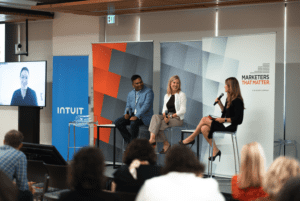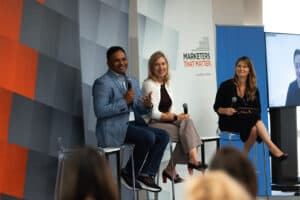What do you get when you combine younger, digitally-agile generations entering the consumer base, a global pandemic, and ever-changing technology? Many marketers are finding an entirely new business environment rife with opportunities. That said, there is a great need for companies to evolve their marketing strategies. The future of everything is before us, and businesses must adapt if they want to survive.
At Marketers That Matter’s recent summit, hosted by Intuit in Silicon Valley, top marketers came together to tackle these looming questions about the future. How do companies stay current to meet evolving consumer expectations? How do we market to a new generation with strict standards? What does the future of technology mean for marketing practices today?
Three top marketing leaders took the stage to share how they are staying relevant in a world that seems to shift by the minute.

To help guide the conversation, Sara Mascall, SVP of The Wall Street Journal, moderated an incredible panel titled, “The Future of Everything,” which is one of the core platforms of The Wall Street Journal.
Kristin Patrick, EVP and CMO of Claire’s, strives to bring brands into the future and maintain their status as household names beyond the confines of brick-and-mortar storefronts. Suzanne Kounkel, CMO of Deloitte, utilizes creativity and collaboration to keep customers happy and businesses growing. Ravi Kandikonda, SVP of Marketing at Zillow Group, aims to deliver personalized, data-driven marketing solutions that help make home a reality for more and more people. All three represent the future of marketing and share their framework for success.
You can find the MTM Visionaries podcast on Apple, Spotify, iHeart, or wherever you get your podcasts!
Overview:
- Meeting Ever-Changing Customer Expectations
- Consumers As Creators: Reaching the Next Generation
- Minding The Gap between Digital and Physical Worlds
- Key Takeaways for Creators of The Future
Meeting Ever-Changing Customer Expectations
Over the last few years, marketers have seen unprecedented shifts in customer values, needs, and expectations. For Kristin Patrick, remaining relevant as a brand means meeting consumers where they are: “Consumers shop and engage the way they want to and when they want to, so we have to be present on every platform and across every facet of their lives,” she said. Consumers know what they want, and it’s up to companies to figure out what that is and give it to them in a meaningful way.

Creating meaningful customer experiences goes beyond creating products and services; consumers desire to interact with companies whose values align with their own. According to Suzanne Kounkel, they need to “trust the organization they are doing business with, leading with empathy and humanity is a business imperative, and it’s important to remember that building trust is essential for developing the framework of brand loyalty.”
Part of maintaining that trust is changing with the times and knowing what future generations want. Ravi Kandikonda stresses this point: “Change is happening, and customers are telling us that it’s happening. So how do we adapt to that? It’s going to be the difference between brands that sustain and remain relevant versus those that do not.”
Consumers As Creators: Reaching the Next Generation
It is no surprise that the generations immersed in technology from childhood have very high standards when interacting digitally with businesses. For Gen Z and Gen Alpha, businesses must be tech-savvy, not just on one or two platforms. Suzanne describes Gen Alpha—those born after 2010—as “creators who crave influence, change, and making their mark on the world.” Marketing to these generations is a unique endeavor, as it’s about “being discoverable at the time they need you,” she continued.
Kristin concurs: “Inspiration should come from the consumers. What brands need to do is set the stage for them.” She also emphasizes that falling back on older strategies won’t work. Younger generations are creating their own futures in a world that is ‘phygital’ — with the best aspects from both the physical and digital worlds – and one that changes rapidly and without notice.

Ravi noted significant changes in homeownership trends since the pandemic began. A recent Gen Z Planet survey indicated that a higher population of Gen Z is interested in owning a home in the future compared to millennials (87% vs. 63%, respectively), in part because an increase in remote work during the pandemic creates more affordability opportunities.
Marketers must keep an eye on current and future trends to understand what the implications may be for their customers, and must be ready and willing to position their brands accordingly.
Minding The Gap between Digital and Physical Worlds
Contemporary brands cannot be successful without fully embracing the technology domain and its dynamic advances. It is astounding to think about how far technology has come in the past ten years. Twenty years ago, there were no iPhones, and today we have the metaverse—a completely immersive virtual world.

Sara Mascall, SVP, The Wall Street Journal, shares that The Wall Street Journal recently wrote an article called, “What Will the Metaverse Mean?” Estimating the investment into the Metaverse for companies will range between 2.5 trillion to $16 trillion by 2030.
For Kristin, this means companies must “create brands that live between the physical and digital. There’s a real opportunity for a brand like Claire’s to go into the Metaverse thoughtfully; we have to be on the bleeding edge of the phygital (physical/digital) connection because our consumers are in it every day.” For a customer base that lives primarily in the digital, it needs to be a seamless customer experience that fully engages with the digital world and brings it to life.
Ravi acknowledges that it’s become clear what Zillow’s brand needs to prioritize and how important it is to stay current and provide future generations with a seamless digital experience. “For many, it’s shocking to think that somebody would virtually tour a home, look at the 3D aspects of it, and make a purchase decision, likely one of the largest buying decisions they’ll ever have to make in their life.”
However, it seems for those raised in the digital world, it’s second nature, and the influence of technology’s role in decision-making is expected to continue to grow. Ravi thinks about how to support Zillow’s customers in three ways: educate, engage, and enable. He added that “First-time home buyers are most likely Millennials and Gen Z, so how we help them on their journey needs to be on whatever platform they are on.”
For example, Zillow has expanded educational content about homeownership on TikTok to provide interesting and informative content to potential customers while meeting those audiences where they are. They are also thinking of ways to increase engagement on the Zillow platform through personalization and customized experiences, such as the new hidden homes feature or the ability to compare homes across different geographic locations. Zillow is also building ways to enable decision-making for customers through immersive experiences such as AI-generated floor plans, 3D tours, and augmented reality.

According to Suzanne, “Deloitte is doing a lot to help clients understand the metaverse. B2C brands will lead the way, but interestingly enough, B2B needs it more.”
“The metaverse may not reward first movers, but it will reward first experimenters. If you wait to see what happens, your brand will pay the penalty.”
-Suzanne Kounkel, CMO, Deloitte
Marketing is all about being relevant in new channels—but not without intention. Kristin and Ravi agree that marketing with empathy and purpose is essential. Brands must be able to adapt to whatever platform consumers are on, but not without a clear vision about the experience they want to deliver and the ability to meaningfully connect back to the core business.
Key Takeaways for Creators of The Future
In an ever-evolving world, staying relevant is a challenge not suited for the faint of heart. The next generations have unflinching expectations for companies in terms of their values and digital experiences—but if you allow them, their creativity may prime your brand for the future of everything.
Reach toward the rapidly evolving technology and plant your feet in your brand purpose; this is how you will create meaningful consumer experiences and build strong brand loyalty. The future is bright, and with a forward-thinking mindset and efforts to meet consumers where they’re at, your brand can certainly grow, if not thrive, amid the unknown.
_________________________________________________________
Moderated by Sara Mascall, SVP of The Wall Street Journal. See their platform, “The Future of Everything“, for more rich content!
Visionaries, hosted by Nadine Dietz, airs every Tuesday at 9 AM PT and is brought to you in partnership with The Wall Street Journal. Each week, two new visionaries share their game plan and how that impacts today’s teams, talent, and hybrid work environment.
Kristin Patrick, EVP and CMO, Claire’s: Kristin Patrick is a forward-thinking executive, who has been responsible for repositioning brands across lifestyle industries, including entertainment, beauty, fashion and CPG. She most recently served as the global CMO of PepsiCo, responsible for delivering the company’s long-term global growth strategy and expansion plans across the entire Billion-dollar portfolio of brands. Prior to PepsiCo, she held leadership positions at renowned global brands, including as Chief Marketing Officer for Playboy Enterprises and at William Morris Endeavor, NBC Universal, The Walt Disney Company and Revlon, GAP Inc., Liz Claiborne’s Lucky Brand and Calvin Klein. Kristin joined Claire’s a little over a year ago as CMO to play a role in building on the fashion brand’s more than 50 years of leadership as a global creator and influencer of youth culture and to take the brand into the future.
Suzanne Kounkel, CMO, Deloitte: Suzanne Kounkel is a Principal in Deloitte Consulting LLP and the CMO of Deloitte. As the leader of Deloitte’s integrated marketing and sales organization, she pushes the bounds of creativity and collaboration in pursuit of two intertwined goals: happy clients and healthy business growth. Her business, technology, and marketing experiences are the foundation for spearheading marketing and sales in an era of rapid change and ground-breaking innovation. She served as the CMO for Deloitte Consulting LLP and led Deloitte’s US Consulting Tech Sector industry practice, one of Deloitte’s largest and fastest growing businesses. As a driver of transformational change, she led Deloitte’s US Customer market offering (which includes CMO services), created Deloitte’s Next Gen CMO Academy, and developed Deloitte’s customer, market, product, and M&A integration methodology.
Ravi Kandikonda, SVP Marketing of Zillow Group: Ravi Kandikonda is the marketing leader for all Zillow Group businesses, including Zillow and Trulia. Recognized as one of the “The Most Influential Leaders” in the industry, he is responsible for brand leadership, personalization of go-to-market initiatives, driving demand across digital / contact channels, and delivering market share and EBITDA growth. Ravi has transformed organizations focusing on delivering robust consumer engagement through highly personalized experiences that leverage consumer journeys, insights, analytics, artificial intelligence, and machine learning capabilities. He is known for outstanding P&L management, being a change agent, building outstanding teams, and delivering industry-leading market share growth balanced with customer experience improvements.
Marketers That Matter® is a community of top marketing executives coming together to pioneer the future of marketing, sharing real-time experiences, and solving current challenges.
Our parent company, 24 Seven, specializes in helping you find exceptional marketing and creative talent for your teams.

